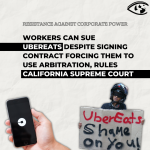UK: Internet Helps Link Fed Up Consumers
They are the new breed of consumer champions. Passionate, computer-literate
professionals who are hitting back at companies by providing forums for angry
shoppers to share their nightmare experiences.
These high-street superheroes have set up hundreds of websites during the
past couple of years. Each one highlights what are perceived to be poor-quality
products, potential scams or dismal customer service.
It's a very effective approach. Every month, the most successful websites
receive millions of hits from consumers eager to take revenge on corporations by
airing their grievances.
Lisa Jones, editor of .net magazine, believes a sharp rise in the number of
homes with high-speed internet connections has helped fuel the enthusiasm for
these so-called gripe sites.
"The appeal of the internet to consumers is that they find it cheap and easy
to post information, and they know it's probably going to be read by a lot of
people," she says. "In the past, they had to write to the editor of their local
paper, where it would have to be selected and edited before appearing. The
community aspect of forums means that they can find out if others have had
similar experiences. It's all about people power."
But even in this relatively new hi-tech world, the sites' approaches vary.
Some focus on a single issue, while others encourage dissatisfied customers to
exchange information on a variety of topics.
In addition to www.grumbletext.co.uk (see below), there are now plenty of
specialist message boards and chat rooms where such problems are discussed. They
include www.blagger.com, which
encourages visitors to leave comments - good and bad - about companies they have
used, and www.letsfixbritain.com which features consumer issues among a
diverse range of topics.
Some sites take a particularly hard line on individual firms. Often they
begin life as the result of a particularly bad experience, but end up getting
support from people who claim to have had similar problems.
Richard Dobbie, a graphic designer, started a site - www.shellpluspoints.co.uk
- last year to protest about the problems he claimed to have endured with the
pluspoints loyalty scheme operated by petrol station giant Shell.
The 29-year-old discovered serious discrepancies between the number of points
he had earned and those that had been credited to his card. He contacted
customer services, but, after running out of patience, he decided on a more
drastic course of action.
"I noticed the website was shellpluspoints.com and then found the .co.uk
version was available, so I bought it for a few pounds," he recalls. "I posted
an account of what had happened to me and put an e-mail address asking anyone
who had similar problems to get in contact. It snowballed from then."
Dobbie, who claims to have received more than 600 e-mails since the site went
live, is now in talks with Shell about selling the domain name. While reluctant
to be drawn on the actual amount sought, he says he wants a five-figure sum.
But Shell defends the scheme, which it insists is "valued by customers" and
offers competitive rewards. The company also says the dispute had now been
amicably resolved - a claim which is denied by Dobbie.
"Shell takes the views of its customers very seriously," its statement says.
"In response to a small number of concerns, we changed the customer service
response, so that pluspoints can be awarded over the telephone. When errors do
occur, we are more than happy to recompense customers."
No industry is free of complaints. A five-minute trawl on the internet
provides access to numerous sites targeting particular companies and industries.
There are sites focused on a string of companies and services, such as BT
Openworld, BMW, Ford, Volkswagen and American Express. Some sites look highly
professional and have a serious message; while other sites are clearly just mad
rants.
For example, typing "natwest bank" into one search engine not only gives you
links to sites affiliated with the bank itself, but also to a site named www.natwestfraud.com, set up
by a disgruntled former customer.
The bank is very much aware of this site's presence. "NatWest takes the issue
of sites such as this one very seriously," says a spokeswoman. "We regularly
monitor the use of our brand names on third party sites, and we will not
hesitate to take action as and where appropriate."
Microsoft, the software giant, has also come under attack from online
opponents. Dheeraj Vasishta, 30, a self-employed IT consultant from New Jersey
in the US, is behind the website www.microsuck.com.
The site, which looks very similar to the design of official Microsoft pages,
criticises the way the company goes about its business, while visitors suggest
buying software packages produced by rival companies instead.
"The site is better known among technical people, where it has almost
household name status," he explains. "People can discuss their own experiences
of Microsoft products or talk about better alternatives they have found
elsewhere."
Unsurprisingly, the site hasn't gone unnoticed by Microsoft itself. "Our main
concern is that customers know how to get hold of legitimate information about
Microsoft, rather than being phased by these sites," says a spokesman. "We have
seen it, and it's quite obvious from the content that it's not an official
Microsoft site."
Some consumer websites are now shunning the confrontational response in
favour of building bridges with the companies they criticise.
One such example is www.howtocomplain.com. As well as providing a chat forum to share
experiences, it also has detailed information on consumer rights, complaints
procedures and even links to the firms themselves.
Stuart McCandlish, the 36-year-old founder, whose day job is banking, says
the site has proved popular. As well as receiving more than a million hits each
month, it also handles up to 50 complaints every day.
"Our aim is to bring consumers and companies together," McCandlish explains.
"People can complain about pretty much everything, but can also get access to
help and advice."
The trend for this consumer approach is likely to continue. Last month, BT
signed up its five millionth broadband customer - a year ahead of schedule. By
this summer, it is predicted that 99.6 per cent of the UK's households and
businesses will be connected to broadband-enabled telephone exchanges.
Setting up a website is also increasingly easy. Many service-providers offer
free space as part of the monthly connection package, while a domain name will
only set you back a few pounds every year.
You don't even need design skills to produce your pages, as specialist web
companies can provide a variety of templates. You just add the content.
However, anyone considering starting up their own such site must be aware
that there are potentially disastrous legal consequences for making untrue
allegations which are defamatory of companies or individuals, warns Guy Martin,
of law firm Carter-Ruck.
"If what they have written is defamatory, they will need to be able to
provide evidence admissible in a court proving that what they are alleging is
substantially true," he explains. "If they are sued - and lose - it could cost
them hundreds of thousands of pounds."
As is often the case with legal issues, nothing is straightforward. The
general definition of defamation is something said which lowers a person or
company in the estimation of others. Also, if the material is defamatory, the
claimant hasn't got to prove they have suffered any particular loss - the court
will automatically assume that damage has been done to their reputation.
"If someone is criticising goods produced by a company, that may not be
defamatory of the company itself - it all depends on the context and language
used," adds Martin.
"However, they would need to be very careful before making an allegation that
a company was fraudulent or had acted without good faith."
Finally, don't forget that as well as taking action through the internet,
there are ways to resolve most consumers' complaints before everything gets out
of hand and both sides lose their tempers.
For example, if you have a dispute with a financial services company, City
regulators run a free and independent ombudsman service that will adjudicate on
your case. It also has the power to order companies to pay you compensation.
- 189 Retail & Mega-Stores



